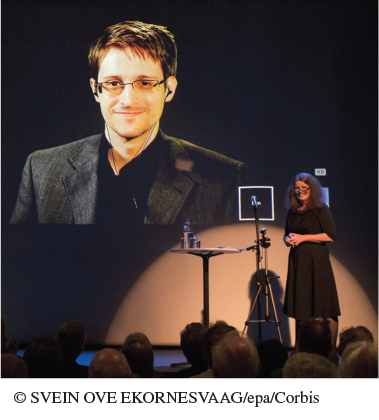A History of Western Society: Printed Page 1036
A History of Western Society, Concise Edition: Printed Page 1040
Individuals in Society
Edward Snowden

E dward Snowden — traitor or hero? When the former CIA operative leaked a trove of classified documents about American surveillance programs to the world press, he was praised by some, vilified by others, and ultimately indicted on espionage charges by the U.S. government.
Snowden perhaps seems an unlikely candidate for masterminding the biggest intelligence leak in history. Born in 1983, the gun-
As a systems analyst with a high-
In January 2013 a journalist working for the liberal British newspaper the Guardian and an American documentary film maker received e-
The explosive news reports described extensive U.S. spy programs that shocked people around the world. The leaks revealed that the NSA had collected phone records from virtually every person in the United States and had misled the U.S. Congress about the extent of the surveillance. The agency had accessed the Internet servers of major telecommunications providers and could thus collect information about e-
The response took many forms. Foreign leaders were dismayed by the extensive leaks from a major allied security service and by the pervasiveness of U.S. surveillance programs. Conservative pundits and U.S. officials condemned Snowden, arguing that the leaked materials revealed secret antiterrorism operations and could even endanger the lives of agents in the field. As President Barack Obama put it, “If any individual who objects to government policy can take it in their own hands to publicly disclose classified information, then we will not be able to keep our people safe, or conduct foreign policy.”†
Proponents of civil liberties, defenders of the right to online privacy, and critics of U.S. foreign policy nonetheless welcomed Snowden’s revelations. “It is time for President Obama to offer clemency to Edward Snowden, the courageous U.S. citizen who revealed the Orwellian reach of the National Security Agency’s sweeping surveillance of Americans,” wrote a liberal commentator in the Washington Post. “His actions may have broken the law, but his act . . . did the nation a great service.”‡
Fearing for his freedom, Snowden went underground in Hong Kong. Several weeks later, he surfaced in Russia, where he received an offer of temporary asylum. Snowden now lives somewhere around Moscow, where he continues to comment on electronic surveillance and privacy rights.
QUESTIONS FOR ANALYSIS
- Why did the arrival of the digital age lead to heated debates about the individual’s right to privacy?
- Where would you draw the line between the need for online privacy and the government’s need to collect personal information in order to protect society from terrorist attacks? Where does Snowden fit in?